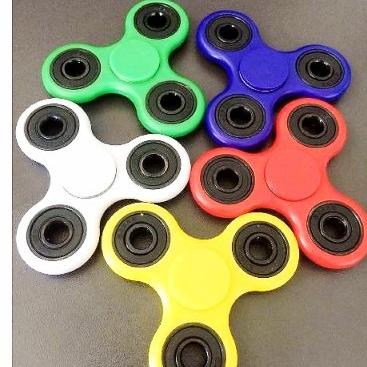
News

Fidget spinners: The jury is out
TALI FEINBERG
Fidget spinners are the latest craze and every child wants one or five of them. They are said to help children focus, but some schools, like Crossroads Remedial School, have banned them.
On her website, Bush writes that the fidget spinner is THE toy that is distracting children from screens and giving them a very different brain-body play experience “…and they are intriguing gadgets that beg to be mastered. It is great for stimulating the tips of the fingers which few toys do.
“It requires concentration and fine-motor co-ordination. You can sit and play with it, or get really athletic as can be seen in some of the YouTube tips and tricks videos.”
She says some of the benefits are that they are challenging, creative, collectable, reasonably-priced and low-tech fun that can keep individuals and groups entertained. They are physical and “wake up the brain”, release endorphins (happiness hormones) and encourage perseverance.
Bush adds that they have been touted as having therapeutic benefits, such as distracting children from their anxiety, helping them to concentrate on the task at hand. However, “a whole classroom full of children spinning gadgets, is unlikely to be a productive one, so let’s leave them for playground use”, she advises.
Occupational therapist Nicole Katzenellenbogen says: “There are concerns around the visual impact of such toys. We live in a very visually stimulating world with TV, iPads, posters on every street corner and fast-paced video games.
“In our practice, we are seeing more and more children who are so visually distracted, or visually over-focused, that they struggle to integrate the other sensory systems such as auditory input. This affects their following instructions and even language and communication.
“Fidget spinners in these cases would create more harm than good, as it is yet another visually stimulating object that takes away their ability to focus on auditory or other sensory input in their environment,” she says.
She recommends “more functional and productive ways” to gain the same input in a less obvious and distracting way, such as stress balls; key chains with soft toys to be kept in the pocket or lap of a child; a weighted lap bag with different textures; a fidget cube, as there is less visual input; and movement breaks for children when they lose their focus.
Some remedial schools have banned the toys, even though their learners are supposedly their target market. Crossroads principal, Val Witt, explains: “We found that the children became so engrossed in the spinners, they become a distraction to the owner and to those around the child using them.
“It was impossible for the child to focus on work and it heightened the child’s inability to focus on what was important within the classroom.”
In a discussion on a Jewish mothers’ Facebook page, many mothers said they “hated” fidget spinners, but some said they have seen their children benefit. One mother, Terri Sklar Frankental, wrote: “My kids are more interested right now in perfecting tricks, rather than playing on their iPads. I’m sure there are benefits as they are using different muscles in their hands.”
Director of the Herzlia Foundation, Amanda Borkum Zar, commented in her personal capacity that “as a mother with an ADHD child, I truly see the benefits. While I appreciate that it’s a craze for some, for my one son it provides his sensory-seeking needs and he self-regulates accordingly.”
Elana Gordon, a remedial and extra-lessons teacher in Johannesburg, says: “As a teacher I find them to be a huge distraction to a child that is easily distracted; they are not a useful item for a classroom. I even find that the spinners are a distraction in a one-on-one situation.”
How are Jewish day schools dealing with it?
“Fidget spinners have taken the students by storm at Sinai Academy, as I’m sure in all schools,” says Zeesy Deren, principal of Sinai Academy on the Cape’s West Coast.
“No policy has been made, and we’re sort of letting the phase and craze dissipate naturally. Our approach to the kids when ‘fidgeting’, is if we see it helping, it stays, if we see it distracting, it goes.”
Cape Town Torah High has a similar approach: There is no school policy, and teachers decide how to respond on a case-by-case basis. “Our learners often work independently at work stations and if it helps them focus there, then by all means they can use them,” says Principal Rabbi Avi Shlomo. “However, during classroom time, teachers may ask learners to put them away if they are distracting.”
Principal Sheva Messias of King David Pre-Primary and Grade R School Linksfield, says the school also doesn’t have a policy regarding fidget spinners.
“It’s at the discretion of each teacher as to how and when they allow the children to use them or not. There are children who are sensory-seeking and the fidget spinners are helpful for them.”
“There does need to be rules about when they can be used or not and the children can be involved in making the rules.”
She adds that fidget spinners can also be used as an educational tool if the teacher is creative.
Jos Horwitz, director of Early Childhood Development at United Herzlia Schools and the principal of Herzlia Constantia, wrote to parents: “The latest craze that has hit the market are ‘fidget toys’ that have been so cleverly marketed and are so appealing for our children.
“The purpose of these gadgets is to allow children to participate in learning in the class in a manner that allows them to keep their hands busy and not get distracted.
“As a teaching team, we are well aware of providing children with the environment that suits them best to learn successfully and allow these gadgets if they serve the child best. We believe fully in catering for the needs of each individual child’s learning and plan the classroom with this knowledge in mind.”




